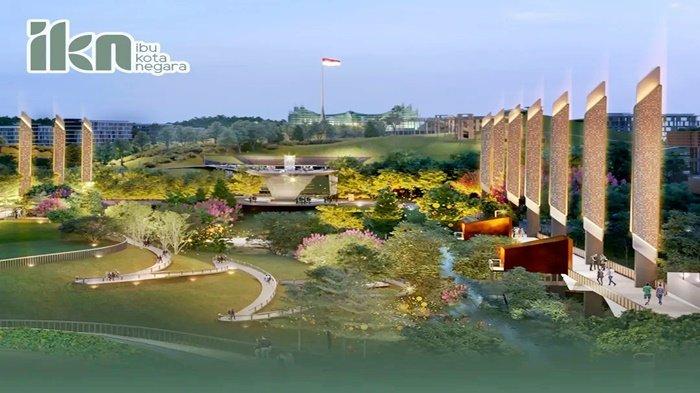The development of the Archipelago IKN Strengthens the Economy of East Kalimantan
By : Eva Kalyna Audrey )*
The existence of the Nusantara National Capital (IKN) development project in East Kalimantan (Kaltim) apparently has not only had an impact on employment, but has also strengthened the economy in the region where in the previous quarter positive growth in East Kalimantan managed to grow by 6.95%.
The National Development Planning Agency (Bappenas) predicts that the impact of IKN on East Kalimantan’s economic growth can increase by between 8-9 percent during the construction and operation periods.
Regional Secretary (Sekda) of East Kalimantan Province, Sri Wahyuni agrees that IKN will bring good luck to the economy of East Kalimantan. Mainly, North Penajam Paser (PPU), Balikpapan and Samarinda. It can be seen from the national agendas that were held in East Kalimantan, so that the occupancy of hotels, restaurants, MSMEs, all experienced an increase.
It is this trend that drives the real sector so that the East Kalimantan economy continues to climb. It is undeniable that since the IKN began to be built, the economic impact has been extraordinary for East Kalimantan.
Sri explained, just at the beginning of development, East Kalimantan had already had a tremendous impact. Moreover, in the future, of course, economic equality will really occur in Indonesia. His party is also optimistic that East Kalimantan’s economy this year can grow better, in line with the continued development of the IKN.
Bank Indonesia also predicts that this year’s East Kalimantan economy will strengthen again in the range of 4.30-5.10 percent (yoy), in line with improving domestic economic performance amidst a global economic slowdown. In addition to mining and quarrying which are predicted to continue to record good performance, the construction of the National Public Industry is also one of the calculations that is considered to continue to keep the economy strong.
From development alone, the construction sector has grown along with the recruitment of workers and technological developments that have entered East Kalimantan, so inevitably the economic turnaround can be faster.
On a different occasion, Bank Indonesia (BI) Representative Office for the Province of East Kalimantan (Kaltim) said that the impact of supporting infrastructure development in the Archipelago National Capital (IKN) area had already been felt. Especially from an economic standpoint.
The Head of the BI KPW for East Kalimantan Province, Ricky Perdana Gozali, said that a special survey to calculate the impact of the construction of the IKN in East Kalimantan had not been carried out, other parties had not done it either, but the general economic impact could already be felt.
The impact can already be felt, including government investment for the construction of IKN supporting infrastructure in the form of the Sepaku-Semoi Dam in Sepaku District. The construction of the project involves a lot of manpower.
So that the other impacts of this project include the need for food, drink and basic daily needs that are also felt by local residents because local residents’ products are purchased by IKN project workers.
Meanwhile, Senior Economist at the Center for Reform on Economics (CORE) Indonesia, Piter Abdullah Redjalam, admitted that he had seen the economic impact of the development process of the Nusantara IKN.
Piter said, construction materials such as stone, sand and cement sent from Java or Sulawesi make economic activity more lively, because there is a kind of multiplier effect that arises as a result of these economic activities.
In addition, the economic impact is also starting to be felt from the tourism sector. Because since the zero point of the IKN was established, the location has become a new tourist destination which is frequented by local tourists. These activities, of course, definitely involve the transportation business that takes them.
Piter explained, since President Joko Widodo first made a visit to the IKN, this activity has given rise to economic movement. In the future, he believes that the community movement will be even more massive so that many series of economic impacts are created from the IKN development process.
Piter added, the government is not too clear about the quantitative impact of the IKN development on the regional economy. However, from some of the information that Piter received, he claimed that there were added values and new economic potential at the point of the megaproject development.
Previously, the Minister of Tourism and Creative Economy (Menparekraf) Sandiaga Uno would bring 10 large investors to IKN Nusantara. Investors will be offered investment opportunities in the tourism sector in the new capital city.
Sandiaga said development at IKN Nusantara would focus on developing natural and sustainable tourism in accordance with its concept as a jungle city. Later interested investors will be directed to develop these tourism advantages at IKN Nusantara.
To support the development of the tourism sector in East Kalimantan, the Ministry of Transportation (Kemenhub) is also preparing to build a tourist jetty located in the Archipelago National Capital (IKN) area in East Kalimantan.
Director General of Sea Transportation of the Ministry of Transportation, Arif Toha said, the construction of the pier was carried out as a support for tourist boats for tourists who will visit IKN.
With so many economic movements in East Kalimantan, this shows that the development of the Archipelago IKN seems to have had an impact on strengthening the economy in East Kalimantan, this is of course good news as well as a form of the government’s commitment to development in an Indonesia-centric manner.
)* The author is a contributor to the Cross Nusamedia Institute
